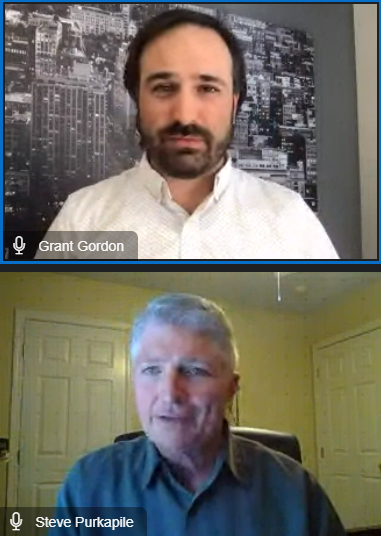 "Today data-driven advisory is a competitive advantage, but tomorrow it's going to be a necessity," declared Artemis Health CEO Grant Gordon. (Credit: MiniStocker/Shutterstock.com)
"Today data-driven advisory is a competitive advantage, but tomorrow it's going to be a necessity," declared Artemis Health CEO Grant Gordon. (Credit: MiniStocker/Shutterstock.com)
In a Tuesday afternoon session at the BenefitsPRO Virtual Broker Expo, Robert Kelley, HR benefit consultant for the North Carolina Office of State Human Resources, made the case for collaboration between benefits specialists and broker/consultants. On Wednesday, two industry leaders argued for the importance of a third participant in that collaboration: Data.
The session, "What Benefit Leaders Actually Want and How Brokers and Consultants Can Help," was led by Artemis Health CEO Grant Gordon and HUB International regional director of financial consulting Steve Purkapile. Their conversation ranged from the concerns of benefits leaders to how data can help address those concerns clearly. Brokers and benefits leaders no longer have a choice in achieving a comfort level working with data, either. "Today data-driven advisory is a competitive advantage, but tomorrow it's going to be a necessity," declared Gordon.
Recommended For You
According to an Artemis study, only 18% of employers felt like they were ahead of the curve when it came to analytics solutions and data. "Interestingly," Gordon observed, "when you dig in on those folks, they're much more likely to say that they work with data. We don't think that's an accident." The study also showed that 89% of employers said they trusted their advisers, their brokers and consultants. But when it came to making big decisions, only 20% of them said that brokers/consultants were their go-tos. "I think data is a path for you to increase the percentage of clients that really rely on you most," Gordon said.
The Artemis study found that benefits leaders want to improve employee productivity and satisfaction as much as health. They also value employee feedback about twice as much as feedback from advisers. Gordon recommended brokers/consultants mixing employee feedback into the traditional data that gets used and harnessing that combination to make better recommendations. "In that sense, data can become the bridge for you to create even more trust and get you even more involved in the decision-making process," he said.
Purkapile shared some of his own concerns. "I always tell people, 'If I have one more discussion around raising a deductible or an out-of-pocket cost, I'll retire now.' It's a no-win situation for anybody across the board," he said. Also, he stressed the importance of improving engagement "so that we're not punishing somebody for accessing health care."

Purkapile then talked about how HUB partnered with Artemis to see the impacts of the COVID-19 pandemic on their clients. The resulting data showed an extreme drop in utilization, with primary care and specialist visits dropping precipitously. More concerning was the drop in preventive care visits. "But the good news in this," he said, "was we saw this sudden dramatic increase in telemedicine." Because HUB had made telemedicine part of its core offering, they were able to encourage its use for those who were not taking advantage of the other in-person benefits due to the pandemic. The data helped HUB visualize that.
HUB also compiled population data around age group. They were able to see that Millennials were not as active in primary visits and checkups the way Boomers and Gen-Xers were. "Do we need to think differently about how they get that kind of care?" Purkapile asked. "Are we making sure that we're not putting any hurdles in the way for getting care? Maybe we need to do more digital health care so it's more accessible to this digital generation."
Purkapile praised the ability of data to "tell clear, precise stories that are easy to understand visually" so that clients can take those suggestions "upstairs" and make their case.
The same "check-the-box" data for benefits that's been around for the past 40 years isn't going to cut it anymore, says Gordon. "The more that advisers adopt data, the more that you're going to have to compete on deep data-driven insights that are coming from the intelligence of the people you have working for you. When you recommend something and an action is taken, the impact of that is going to need to be proven with data."
© Touchpoint Markets, All Rights Reserved. Request academic re-use from www.copyright.com. All other uses, submit a request to [email protected]. For more inforrmation visit Asset & Logo Licensing.






